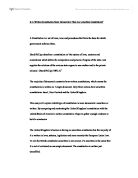“Unless it is constantly changed … a constitution will increasingly contain matter that is out-moded or inappropriate” “The Government and Politics of Ireland” (Chubb: 1982, pg. 18)
On 5th January, 1973, the ‘special position’ given to the Catholic Church was formally removed from Bunreacht na hEireann and replaced by Article 44.2.2° - “The State guarantees not to endow any religion”. It could be argued that this amendment was even ahead of its time considering the multi-cultural society in which we live in today. Article 2 of the Constitution was amended after the Good Friday Peace Agreement in 1998 which changed the status of the island of Ireland from a territory to a community of individuals. The latter amendment, in particular, shows the importance of the Constitution and the amendment of it as the Good Friday Peace Agreement has opened the possibility of peace in Northern Ireland which they are realising today.
The Fundamental Rights that can be seen in Bunreacht na hEireann in Articles 40-44 mostly remain very relevant to today’s society. However, any laws which no longer remain relevant usually face referendum, therefore, the constitution can and does adapt to the changes in society. For example, this can be seen in the Fifteenth Amendment in 1995 which, following a referendum, allowed “for the dissolution of marriage in certain circumstances”. It is also an example of how the Constitution has had to adapt to the multicultural society of today.
Constitutional reviews have also been common over the last forty years, with eight formal reviews taking place in that timespan. One of these, the Constitutional Review Group was established in 1995 to carry out an analysis of the Constitution and publish a report of their findings. The Review Group's report analysed each Article of the constitution making recommendations where necessary. For example, its recommendation for amendment for Article 4 was the following:
“The Article should be amended to read:
Éire is ainm don Stát.
The name of the State is Ireland.” “Report of the Constitution Review Group” (Constitution Review Group, 1996: pg. 7)
There have also been three All-Party Oireachtas Committees since 1997 resulting in ten progress reports being published. Since the third progress report, these committees have been dealing with certain aspects of the constitution in each report (e.g. the third progress report focused on the role of the President in Bunreacht na hEireann).
Judicial review is yet another process where the constitution can be altered. This involves the Supreme Court having the power to strike down any laws from the Oireachtas which is deemed unconstitutional. It is simply another method at this state's disposal to dismiss any laws that may be out of date and gives the voting public a change to amend these laws if necessary
The most infamous case of judicial review was in 1992 of the Attorney General vs X. The majority opinion from the Supreme Court appeal was that the right to abortion under Article 40.3.3 did not exist if there was a risk to her health, but not her life. However, this right did exist if there was “a real and substantial risk” to her life. The case resulted in three proposed constitutional amendments on abortion. The referendums were then held in November 1992 which the Thirteenth and Fourteenth Amendments were ratified with the Twelfth Amendment being rejected.
The constitution has had to evolve with the changes in European affairs. The Third Amendment ratified the Treaty of Rome in 1972 which allowed the Republic of Ireland to join the EEC and in 1992 the Eleventh Amendment ratified the Treaty of Maastricht allowing the Republic of Ireland to become members of the European Union. By joining the EU, Ireland has now taken its place in the Single European Market which ensures the free movement of people, goods, services and capital within the member states. Ireland's infrastructure has improved greatly since joining the EU also. These are only two of the numerous benefits that Ireland has received due to the constitutional amendment brought about by the Treaty of Maastricht. This amendment could also be adjudged to be a major factor in the 'Celtic Tiger' that this country has enjoyed over the last decade or so.
The simple fact that the constitution is amendable and has been amended several times since it was drawn up in 1937 should be proof alone that a written constitution does not mean 'rule by the dead'. However, for anyone who could still be sceptical of this fact, all they have to do is look at the Ireland that we live in today and the prominent role that constitutional amendments have played in this country's success over the last decade or so.
Bibliography
- Chubb, Basil (1982) ‘Government and Politics of Ireland’ (London: Longman)
- The Constitutional Review Group (1996) ‘Report of the Constitutional Review Group’ (Dublin: Stationary Offic)







